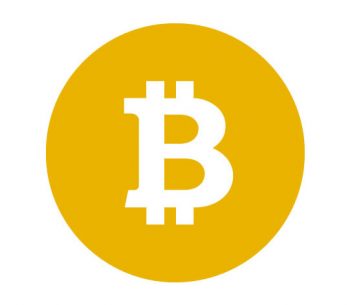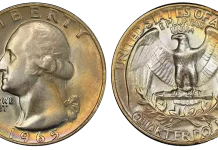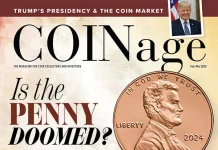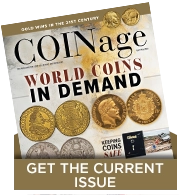
By James Passin
An increasing number of merchants are accepting Bitcoin as a means of payment. A good resource to check for local crypto-friendly merchants is the website CoinMap.org. Despite the 2018 crash in Bitcoin, a number of indicators in 2019 support the view that the Bitcoin network remains healthy, and the overall global take-up of Bitcoin as a payment system continues to expand. Review various statistics at BitcoinVisuals.com/stats.
The volatility of Bitcoin has fallen below the volatility of the S&P 500 and other major traditional financial market indices for various recent periods of time (EthereumWorldNews.com/bitcoin-price-sp-500-volatility-2018). While the Bitcoin price has fallen over 90% from its all-time peak, the Bitcoin market remains highly liquid, with average daily trading volumes of $4.9 billion of cumulative reported by cryptocurrency exchanges.
Walking the bourse floor of the January 2019 Florida United Numismatists (FUN) show in Orlando, I was surprised by the inability of most rare coin dealers to take Bitcoin as a means of payment. The storage and transmission of Bitcoin is so easy, fast, and cheap that it is a useful backup for anyone who forgot to stop by the bank to withdraw physical cash from an ATM. My sense of surprise was accentuated by the fact that, in advance of the show, I noticed that a number of large precious metals dealers including APMEX (Apmex.com/now-accepting-bitcoin) accept Bitcoin as payment in settlement of metals orders.
At FUN, I was hunting for a few specific coins on my want list. The dealers who were offering the coins I desired do not accept Bitcoin as payment. Fortunately, I had long-term relations with these dealers who had those coins and were able to make my purchases on credit.
I have always liked gold. It represents a possible alternative to the paper money system that has corrupted the global economy. Interestingly, I have never met a gold aficionado (“gold bug”) who will concedes that his or her conviction that “gold is money” has been broken by a decline in the spot price of gold. No gold bug will reject his or her ideology of sound money because it is practically impossible to use a gold coin to pay for a cup of coffee. Gold, nonetheless, has been an undeniable store of value and medium of exchange for thousands of years. And gold, unlike fiat money, cannot be created out of thin air by central banks.
Bitcoin, like gold, represents an alternative monetary system to fiat money. Instead of monetizing a metal that is physically extracted from the ground, Bitcoin monetizes the mathematics that is woven into the very structure of our universe.
Galileo wrote: “The Book of Nature is written in the language of mathematics.” As a peer-to-peer payment system built on open-source code, Bitcoin works as a permissionless system, without any centralized regulatory body or trusted third parties.
I praise the leadership of Kagin’s (Donald H. Kagin holds the first Ph.D. in numismatics) in accepting cryptocurrency as a means of payment in numismatic auctions. This is a welcome development, as the holders of Bitcoin and other major cryptocurrencies have a natural ideological affinity for gold, rare coins, and other hard assets. In my view, the free-flow of liquidity between gold and Bitcoin will provide the escape route for those of us who do not want to go “down with the ship” when the grand experiment of the fiat monetary system possibly resolves itself through hyperinflation.
Kagin’s uses BitPay as a means of settling the purchase of gold coins with Bitcoin. BitPay acts as a payment solution for vendors by taking the Bitcoin and pays fiat currency to the vendor. This enables the vendor to mitigate Bitcoin volatility. BitPay also offers a pre-paid debit card than can be loaded with crypto and used for fiat purchases. See Bitpay.com.
While I admire BitPay as a fintech innovator, I expect that in the future, more vendors will accept cryptocurrency directly, without “trusted” third parties. The rise of “stablecoins” will provide a tool for overcoming the perceived volatility of Bitcoin. Stablecoins are cryptographic tokens that are either backed by a real-world asset or built on protocols that use algorithms that tend to counter volatility, with the objective of creating a widely accepted cryptocurrency that reasonably predicts modest volatility. This will close the loop and accelerate the mainstream adoption of cryptocurrency.
Bitcoin’s inherent lack of scalability has opened the window for competing cryptocurrencies to grab market share. The Bitcoin network can only process three to seven transactions per second; this is totally inadequate to serve as a viable monetary platform. Various factions have forked off altcoins, such as Bitcoin Cash, to attempt to create more scalable alternatives to Bitcoin, although the altcoins have not seen widespread adoption and have seen similar or even worse price declines than Bitcoin
The rise of the Lightening Network, a second-layer payment protocol built on top of Bitcoin, has created the scalability that may enable Bitcoin to entrench its role as a true alternative monetary platform. The Lightening Network, which is experiencing explosive growth, appears to have solved bottleneck of the Bitcoin network and may hasten its widespread adoption as a means of payment. See Coingape.com/lightning-network-growth-exploding.
In the end, I view Bitcoin, like gold coins, as something to accumulate and hold, not spend. There will only be 21 million Bitcoins ever in existence. It may make sense to accumulate at least a modest position in case either cryptocurrency-based applications take off commercially or some unexpected shock implodes the global fiat monetary system. No amount of lecturing from Keynsian economists, central bankers, bank CEOs, socialist-democratic congress members, financial market regulators, or even rabid gold bugs will induce me to surrender my own monetary sovereignty.
Famed “daredevil investor” James Passin, Chartered Market Technician, is Executive Chairman of Blockchain Holdings, Ltd. (symbol BCX on the Canadian Securities Exchange), a public company listed in Canada. The company provides unique insights into the growing ecosystem of crypto-assets through bcxdata.com. BCX developed proprietary indices to measure broad categories of cryptocurrencies. By improving transparency, BCX hopes to also improve liquidity in cryptocurrency markets.














